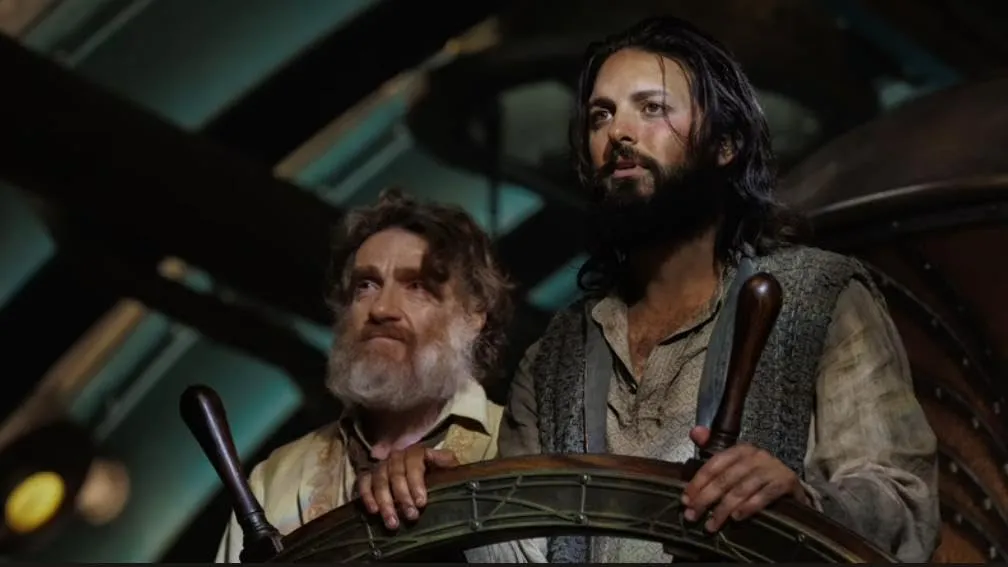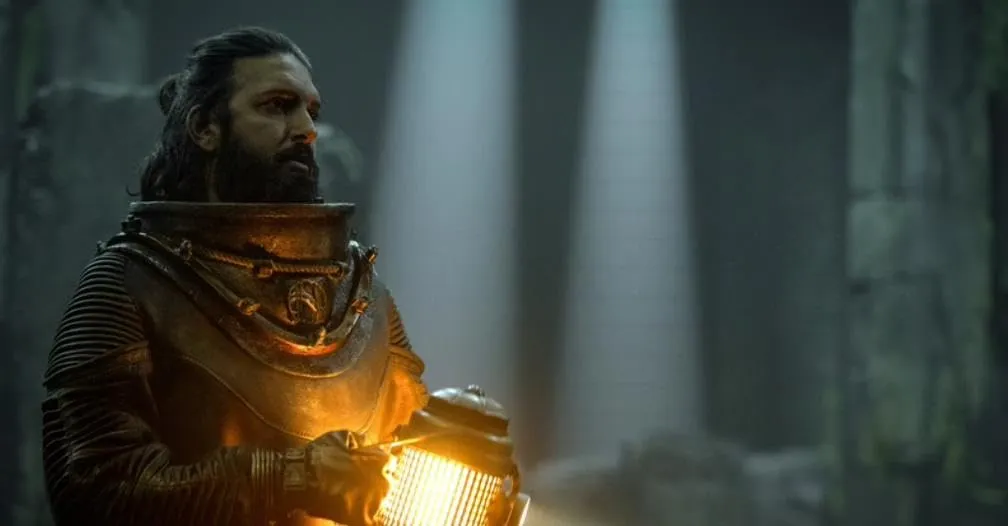Jules Verne was known for tales of imagination and exploration. Back in the 19th century, his novel Twenty Thousand Leagues Under the Sea told of a mysterious submarine captain called Nemo. Now Nautilus brings that story to the screen by telling Captain Nemo’s own tale.
We meet Nemo in 1857 India, where he’s forced to work under the oppressive East India Company. A brilliant engineer, he secretly designs a submarine even more advanced than what’s known today. When the chance arrives, Nemo steals this creation—the legendary Nautilus. From then on, he and his diverse crew embark on underwater journeys across the seas. Their missions allow glimpses of uncharted marine worlds.
Of course, the company won’t let Nemo escape so easily. They give chase with battleships and troops. This sets the stage for adventures over Nautilus’ 10 episodes. Nemo strives to outwit the pursuers while exploring mysterious underwater life. Along the way, deeper themes emerge of colonialism, liberation, and scientific progress.
This review covers Nautilus’ adaptations of its source material. It examines the character development led by Nemo, played captivatingly by Shazad Latif. The storytelling, production qualities, and handling of themes also receive analysis. Ultimately, this aims to share how successfully Nautilus brought Jules Verne’s undersea visions to the screen for modern audiences.
Expanding the World of Jules Verne
Nautilus aims to bring Captain Nemo’s story to life while building on what Verne created. His famed novels Twenty Thousand Leagues Under the Sea and The Mysterious Island laid the foundations.
The show keeps elements like Nemo commanding the advanced submarine Nautilus. Viewers follow the ship into perilous underwater adventures and encounters with marine life. Nemo’s quest for knowledge through exploration stays true to his character.
Where Nautilus diverges is in fleshing out Nemo’s backstory. The series reveals his origins as an Indian prince robbed of his kingdom. It presents a logical motivation for his thirst for revenge driving the story’s action. Developing this angle provides richer context around Nemo without changing his core.
Fans appreciate seeing Verne’s vision brought to life. His imaginings of futuristic technology and unexplored realms now feel within reach. Newcomers gain an entry point into his timeless works.
At times the extended format strains to sustain tension. More could be done with subtly placing Easter eggs for readers. Some plotlines involving side characters feel stretched.
Still, focusing on Nemo as the centerpiece allows honoring Verne’s creation. Placing him within an original but not contradictory story expands familiar elements. It brings renewed interest to the classics while crafting its own standalone adventure.
Overall, the adaptation succeeds more than it falters by building thoughtfully on Verne’s foundation. Both devotees and new audiences benefit from its freshened yet faithful interpretation.
Captain Nemo and His Crew
At the heart of Nautilus is the captivating Captain Nemo, played superbly by Shazad Latif. He brings just the right blend of passion, intelligence, and turmoil to the role. Nemo’s journey from oppressed engineer to liberated explorer seeking knowledge drives the entire narrative.
Latif ensures viewers fully engage with Nemo’s plight and understand his thirst for both scientific discovery and vengeance against the oppressors. We feel his losses and cheer his triumphs. Scenes exploring Nemo’s wisdom shine brightly, keeping momentum even in episodes with weaker writing elsewhere.
Among the crew, Humility Lucas stands out as a strong feminist character far ahead of her time. Georgia Flood delivers her intelligence and independence, and her bond with Nemo feels authentic. Their chemistry provides a fulfilling throughline.
Many secondary characters disappear for long stretches, but a few like Gustave find their place. Others like Loti seem there for box-ticking versus meaningful roles. More focus on a select, interesting crew could have strengthened storytelling.
Diverse actors portraying the multinational team lend the imperialism critique authenticity. Though some depictions risk stereotyping, overall representing different oppressed peoples powerfully underscores Nautilus’ themes.
By journey’s end, Nemo sinks roots as one of pop culture’s most beloved captains, due largely to Latif’s nuanced work bringing Verne’s vision to life for new audiences. The series stands or falls on his shoulders, leaving viewers eagerly awaiting more of his Nemo.
Weaving a Complex Undersea Tale
Jules Verne’s stories offer rich material for adapting to the screen, but balancing depth and pace across many episodes poses a challenge. By its expansive nature, Nautilus attempts to do both.
The first few outings onboard the Nautilus effectively set the scene. Viewers are pulled swiftly into Nemo’s world with efficient plot progression. Continuous encounters with fantastical sea life maintain thrill.
However, as the crew’s journeys grow longer, the macro-arcs risk losing their way. Character moments feel diluted; action spaced too thinly. Subplots about minor figures end up treading water. Tightening these sections would serve the story without losing Verne’s spirit of exploration.
The best episodes strike the right balance. Political intrigue comes to a head tactfully in “Colonies and Companies.” Life-or-death dilemmas escalate suspensefully in “Ice and Iron.” Witnessing how crew members bond through trials keeps us invested in their fates.
Not all threads integrate as neatly. Romantic plots between Nemo and Humility feel stilted instead of strengthening their bond against the odds. Comedy sometimes misfires, as when forced charades drain tension.
Despite room for fine-tuning, Nautilus deftly juggles its multi-stranded narrative. Continual resetting of underwater stakes maintains compelling drama throughout. Skilled acting carries even slower passages.
With refinement, this ambitious adaptation could fully satiate those keen to dive deeper into Captain Nemo’s world with each watching. As is, it offers an immersive first glimpse into Jules Verne’s prescient visions that will leave viewers eager for more.
Nemo’s Quest for Knowledge and Justice
Verne packed deep thought into tales of maritime mystery. Nautilus captures this spirit through its overarching themes.
Central is scientific progress clashing with oppression. We see Nemo’s brilliant mind forced into servitude, his works used for tyranny. This sparks his fiery determination to reclaim freedom through exploration.
Nemo’s thirst for vengeance against the colonial system drives the narrative forward. However, the show handles this delicately for family viewers. Revenge remains in the background as curiosity and justice take precedence.
Viewer sympathy lies firmly with Nemo and oppressed crew members seeking liberation. Their multinational ties illustrate imperialism’s diverse human toll. But nuance shows power dynamics come in shades of gray, not black and white.
At its heart, the story champions advancing knowledge without harming others. Nemo discovers underwater realms while non-violently outmaneuvering foes. Critiques of exploitation feel timely yet delivered accessibly.
Deeper inquiries into themes could make Nautilus’ progressive messages soar. But the integrated plot moves any child wondering about big issues to ponder Verne’s imaginations further. Its spiritual successor may dive even deeper.
Overall, Nautilus capably breathes life into timeless issues of scientific purpose amid social upheaval that first fired Verne’s vision. Both fans and new viewers emerge enriched.
Below the Waves: Assessing Nautilus’ Visual Splendor
Transporting viewers into Captain Nemo’s world posed big challenges that Nautilus rises to meet in parts. Creating an authentic 19th-century submarine setting amid fantastical oceans could never be easy.
At its best, the production succeeds in immersing us underwater. Shots of surreal aquatic life feel vivid and help suspend disbelief. Cinematography captures the Nautilus’ sleek interior in luminous detail. Costuming helps distinguish rich eras and cultures.
Sadly, visual effects too often falter. Rather than awe, monster battles prompt unintended humor. Character models interacting with environments appear detached. Scenes demanding scale come across as small-screen.
Yet technical limitations don’t fully undermine the splendor. Atmospheric scores carry emotion where images cannot. Clever interior lighting lends the submarine an enchanting glow. Costume and production design fill sets with period wonder.
Had bigger budgets allowed pristine effects throughout, Nautilus may have fully captivated. But even with flaws, its wonders stay with you. The heart poured into visualizing Verne’s watery visions still shines through.
With refinement, a follow-up could perfectly transport viewers below the ocean waves, rendering the technical marvelous. For now, Nautilus offers promising glimpses of adventures awaiting in Nemo’s aquatic realm.
Captain Nemo’s Voyage to the Screen
Nautilus faced challenges in adapting Verne’s classics but also triumphed in many ways. Chief strengths included honoring scientific wonder at the heart of Nemo’s character. Latif’s nuanced performance kept viewers invested in the captain’s plight.
At the same time, some flaws existed. Pacing lapses and weaker secondaries diluted tension at times. Effects demanding bigger budgets showed room for polishing.
Yet despite imperfections, Nautilus merits praise for modernizing these early visions of underwater adventure for new eyes. It fueled curiosity in readers young and old regarding our unseen ocean worlds.
With refinement in a hypothetical next season, this show could seize even greater heights. Streamlining length while deepening the impacts of smaller characters and relationships would boost storytelling.
Ultimately, Nautilus succeeds more than it falls short in its mission to bring the Nautilus and her enigmatic captain wholly to life. Any fan of Verne’s imaginations or breathtaking maritime sci-fi in general will find much to appreciate in its voyage to the screen. This reviewer comes away hoping Nemo’s explorations may continue across future seasons.
The Review
Nautilus
Nautilus is a commendable effort in translating Jules Verne's legendary novels to a modern screen adaptation. By focusing on Captain Nemo's brilliant yet tormented character and crafting an original yet faithful story that explores timely themes of scientific progress clashing with oppression, the series succeeds in fueling curiosity about these seminal works of undersea adventure for new audiences.
PROS
- Compelling lead performance by Shazad Latif as Captain Nemo
- Faithful adaptation of key elements from Verne's novels
- Intriguing original backstory developed for Nemo
- Effective use of setting for adventure and intrigue
- Exploration of timely themes of science vs. oppression
CONS
- Uneven pacing dragged in places
- Underdeveloped secondary characters
- Plot points felt rushed or overexplained.
- Production values seemed restrained at times.
- Effects scenes didn't always have intended impact.



















































